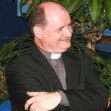The head of the Catholic Schools Partnership has strongly denied RTE reports that the Catholic Church and the  State had “behind the scenes” talks to organise religious education in new VEC-run multi-denominational primary schools in which children are taught religion in their separate faith groups.
State had “behind the scenes” talks to organise religious education in new VEC-run multi-denominational primary schools in which children are taught religion in their separate faith groups.
Speaking on RTÉ Radio’s Drivetime yesterday, Fr Michael Drumm (pictured) said the RTE report which suggested that the Church and the Department of Education had been engaged in secret negotiations to impose a particular type of religious education upon five pilot Community National Schools was “completely at odds of actually what happened.”
The patron of the new schools is the Department of Education, through local VECs.
RTE had reported that the religious education programme for the schools had been forced on them by the Catholic bishops.
Fr Drumm said that the Catholic Church had “a very serious problem with the way this story was run on RTE”.
He said: “The representation of the story was very much as though the Church, the Catholic Church and the State organised behind the scenes the model of a new school. This is completely at odds with the truth of actually what happened.
“What occured is that the VECs were nominated by the State to be the providers of State schools and it was decided over a long period in negotiation with all the education partners that these would adopt a particular form of multi-denominational education meaning that they would provide this type of education in class including faith formation.
“That itself is probably a controversial decision for the VEC sector and the State to make, but that’s the decision they made and they’re overseeing that.”
Drivetime presenter Mary Wilson asked whether the Church had been the main mover behind insisting that separate religious education be carried on during school hours, but Fr Drumm insisted that this was a decision for the patron of the schools, in this instance the Department of Education.
His words came after the Council for Education of the Irish Catholic Bishops’ Conference had also taken issue with the RTE story.
In a statement, they said that they rejected the suggestion “that the Community National Schools’ Programme to teach religion to pupils was proposed and designed by the Catholic Church”.
They said that representatives of the Church’s Commission for Education (the predecessor to the Council) had been invited “to meet with officials of the Department of Education and Skills on 27 April 2007 as part of the consultation process concerning new Community National Schools”.
The statement said that Department officials had indicated that the Community National Schools “would serve the whole community”.
It said: “The schools would serve parents who wish to have their children receive religious instruction and parents who do not wish their children to receive such. Provision for religious instruction would be made during the school day.
“The representatives of the Bishops’ Commission proposed that teachers delivering religious instruction to Catholic students be duly qualified and that the curriculum dealing specifically with the religious instruction of Catholic children be in accordance with the provisions approved by the Irish Catholic Bishops’ Conference.
“The actual programme in religious education was not discussed.”
The statement pointed out that Bishop Leo O’Reilly, then Chairman of the Commission for Education, had welcomed the announcement of the schools.
It quoted Bishop O’Reilly saying: “These schools are being provided at a critical time and will assure a wide variety of access to primary education in accordance with the wishes of parents. The Catholic Church welcomes choice and diversity within the national education system. We believe that it is important to accommodate the rights and needs of people of different faith backgrounds, and of none, to an education which reflects, as far as possible, their sincerely held convictions and values.”















